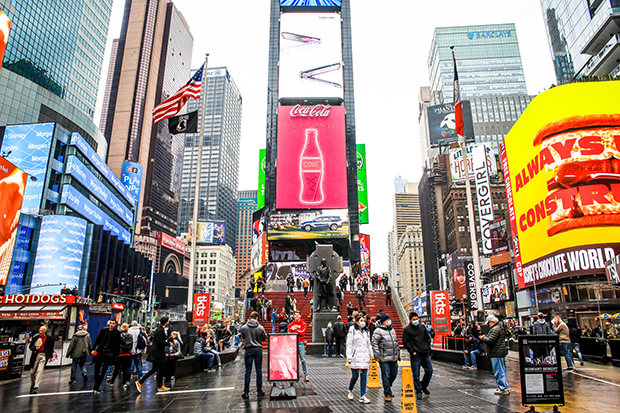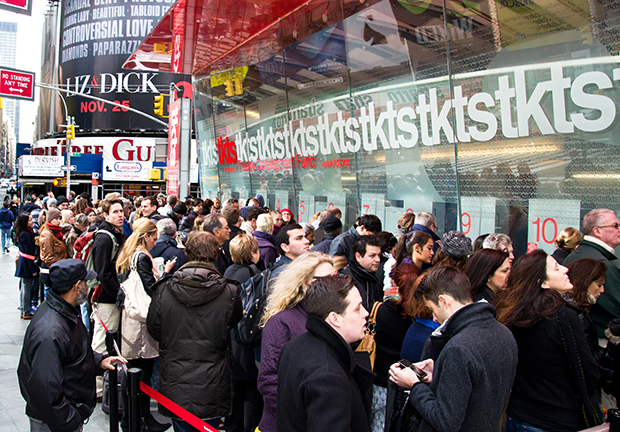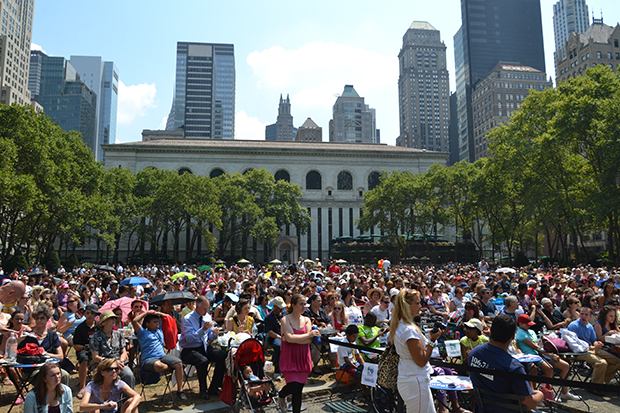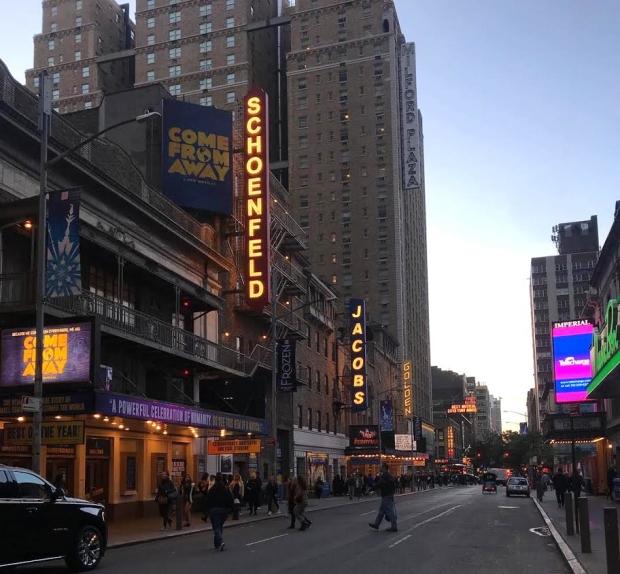Reflections on a Year Without Theater: An Oral History of the Broadway Shutdown, Part 7
Business was booming. Nearly 15 million people had seen Broadway shows during the 2018-19 season. The total box office gross was $1.8 billion. And as the calendar pages flipped to January 2020, every theater had been booked for what was expected to be a prosperous spring, with 21 productions scheduled to open between the first of the year and the late-April Tony Awards cut-off.
By Friday, March 13, that was all moot. The curtain had unceremoniously fallen the afternoon before by order of New York State, as cases of the novel coronavirus ravaged the city and rapidly filled hospitals beyond capacity. There were hundreds of different ways to have seen this eventuality coming — audiences began to thin, whole companies and other theater personnel were getting sick — but Broadway lives by one motto: The show must go on.
The September 11 terrorist attacks kept Broadway closed for a few days. Labor strikes had darkened theaters in the past, but they were generally resolved within weeks. Covid-19 has caused the longest shutdown in the history of the Broadway industry, and while there are glimmers of hope on the horizon in the form of a vaccine, there is still no definitive end in sight.
As we hit the summer of 2020, I started documenting stories from across the Broadway community in an effort to make sense of it all. This is the seventh and final section in a multi-part oral history of the Broadway industry shutdown and its aftermath, as told by the artists making theater eight times a week. These conversations have been lightly edited for clarity and nothing else, but they all paint a picture that could be a metaphor for the world itself: we were all blissfully naive to impending disaster, until.
Read each part of this oral history project here.
In This Section
David Bryan, composer of Diana: A True Musical Story
Kelly Devine, choreographer of Come From Away
Crystal A. Dickinson, actor in Gnit
Joe DiPietro, book writer and lyricist of Diana: A True Musical Story
Brandon Dirden, actor in Take Me Out
Patsy Ferran, actor in Who's Afraid of Virginia Woolf?
Sue Frost, producer of Come From Away
Erika Henningsen, actor in Flying Over Sunset
Jane Krakowski, actor
Marc Kudisch, actor in Girl From the North Country
Michael Lepore, actor in Sing Street
Des McAnuff, director of Ain't Too Proud
Rory O'Malley, actor in Hamilton in Los Angeles
Brad Oscar, actor in Mrs. Doubtfire
Lauren Patten, actor in Jagged Little Pill
Jessica Phillips, actor in Dear Evan Hansen
Shereen Pimentel, actor in West Side Story
Scott Rollison, stage manager of Hangmen
Kyle Selig, actor in Mean Girls
Blair Underwood, actor in A Soldier's Play
Tony Yazbeck, actor in Flying Over Sunset

Tony Yazbeck: My birthday was the Saturday, March 14. The whole cast surprised me the day before, and there were balloons and a "Happy birthday, Tony" sign on my dressing room door. I was really overwhelmed because we knew we weren't coming back the next day. What's crazy is, when I went back into the theater to pick up my personal belongings seven months later, all of the decorations were still there on my door. If that's not a ghostly image, I don't know what is.
Lauren Patten: My costumes are still hanging on the rack as if I can just come in, get dressed, and do the show. The wigs are still sitting in the wig room. We still have everything on our call board for what we were doing the next week. I took a thing of Clorox wipes. It was in my dressing room, under my sink. Sorry, Shuberts. They're in demand!
Crystal A. Dickinson: Brandon [Dirden] and our son Chase and I all drove back to the theater in Brooklyn to pick up my stuff, and that was really sad. I wrote a note on the mirror. Leaving the theater and not knowing when we'd go back to it was really sad.
Scott Rollison: I still have all the Hangmen opening-night gifts. I had gotten everyone little flashlights with our logo on them, because it was very dark backstage. We loaded the show out over the summer — I think the producers probably just couldn't pay the rent anymore to keep the set sitting in the theater. I got to go back and gather my things and I handed out the flashlights to the crew. I walked into the theater and the houselights were on, ghostlight on the stage, and everything was exactly like we left it. The props were right where we left them. We could have done the show that night.
Kyle Selig: Everything's wrapped in plastic, and now the plastic has dust on it. It's all very spooky.
Brad Oscar: In May, we had another opportunity to go back and clean our dressing rooms. I peeked on the stage, and it was just the ghost light, and that made me sad. Everything made me sad. But there it was, in suspended animation, waiting for us. It's all still there. Just waiting.
Erika Henningsen: It's like a museum. It's creepy.
Lauren Patten: Our Jagged Little Pill cast has largely been intact since the workshop. We're used to communicating through periods of time when we're not working on the show. We're not texting nonstop every day, but we do have a history of being a unit through downtime. It's nice to feel like we still have that family.
Brad Oscar: We Zoom every three weeks and three days, because we shut down three weeks and three days prior to opening night. On what would have been our opening night, we had our first company Zoom and read through the script. From that day forward, every three weeks and three days, there's a Doubtfire Zoom. Sometimes it's small, but it's there. It gets harder and harder because people are all over the world. But we try to keep that going.
Marc Kudisch: We still keep in touch. I know a lot of companies have gone through whatever disconnect, and that doesn't mean that we haven't drifted a little bit either, but we have a text thread. The company touches base, I would say, at least once a week. Mare Winningham and Anthony Edwards have this big beautiful place and she had a lovely outing over the summer that some of us attended, and everyone was outside and there was distance. I was not able to attend, but it was wonderful of her to do that.
Erika Henningsen: We would show up on Zoom and somebody would lead a weekly plank for two minutes, which was part of our company warmup. We did that for about two months. Then we started doing monthly hangouts. A happy hour, a game, a bingo night. Then it petered off. I think when we hit month six, a lot of people realized that we would have to shift our expectation of what was going to happen.
Tony Yazbeck: The Zoom calls have morphed over the last several months. We were doing exercises — Michelle Dorrance, our choreographer, would teach a dance step or something, and we'd always tell each other stories. It was every Friday for a while, and then it became every other week. Then there were planned, theme events. Just to be able to see everyone's faces, and to have James Lapine still be positive and still say "We've got a show" — that's what motivates me.
Patsy Ferran: I had a good text exchange going with Rupert Everett, and Russell Tovey and I every now and then touch base. I sent Russell a voice text saying, "Today would've been our last show, I'm just thinking of you!" And he texts back, "Babe, our last show would have been last week." I'd put it wrong in my diary. So I missed it. I totally missed it. But at least it was something. At least I could latch onto that date as an assurance that it actually happened, instead of thinking, "That was real, right? I didn't just dream that?"
Sue Frost: There are a lot of conversations. We don't bombard people with communication, but I was sending something out every couple of weeks, like a monthly update, and always trying to find something positive to focus on. Our companies are all very tight, and they have their own things like that, but it's always important to me to reach out even if there isn't anything really tangible to say, other than "Take care of yourselves" or "Thank you for the work that you're doing," because so many of them are doing charity work and raising money. And they just say, "We appreciate hearing from you, because it reminds us that there's something on the other end of this." That's the most important thing as it drags on: keeping people positive and focused, without blowing smoke at them.
David Bryan: Once I finally got better, I talked to Joe DiPietro and we ended up taking a really bold move and changing the first 30 minutes of Diana. We reordered it, we wrote a new song to replace the second song, and then the whole team got together, hired back all the actors for the month of June, and did a Zoom reading. It was a little silver lining in the pandemic cloud, because we wouldn't have had a chance to do on Broadway. It was way too big of a change. We also recorded the cast album, and then bubbled together and recorded the show for Netflix.
Kelly Devine: I have thought about socially distant choreography. It's trippy. You can't partner anyone. There are no lifts. You'd have to constantly keep it moving. Putting people on different levels would be helpful. People could be going up and down away from each other, but still creating different pictures.
Des McAnuff: We had better be beyond [socially distant staging] by the time we start performing. If you have to keep everyone six feet apart, I would wonder if it's a wise move to go back. I don't see going back to Broadway with people wearing masks onstage. However, if that is required, we would find solutions. We'll do what's required to protect people. But if it's that risky, I would be very frightened that infection would manage to creep its way in. We do not need to risk people's lives. We don't want to go out there and know people are sick. Theater is important to the human soul, but there's got to be a human soul there.

(© David Gordon)
Kyle Selig: I don't know how you'd regulate the audiences. You could take the temperature of everybody in there, but it's so much bigger than that.
Erika Henningsen: Even if a show does successfully handle their cast members, their orchestra, their crew, as soon as there's an outbreak associated with one night in the audience, everything shuts down again. I think we'd be back in theaters sooner if we didn't need people in those seats. Actually, saying this out loud makes me realize that this is going to take a lot longer than I think we've processed yet.
Tony Yazbeck: I don't know how we could ever socially distance inside a theater. We're lucky to only have ten people on stage, but there's the crew, there's are dressers, there are so many things backstage that are happening. Do we put on masks when we're not onstage, or do we trust that we've all taken tests?
Jessica Phillips: In terms of my own comfort level, I don't know. The vaccine is a big part of it for me. We can't do an NBA bubble, because we all go home to our own houses. But we could test every day that we come into work. That could be one element of it. We have to function — and this is the analogy that I make to my kids when they're at their dad's house — like a single pod, as if we are all living together, knowing that any exposure or risk we take on will affect the other house. That's how we would have to come into a work environment. We would have to live by a set of common conduct rules and understand that our choices outside of the workplace will affect everyone else.
Lauren Patten: My feeling safe is different because I've already had it. That doesn't mean I can never get it again, but my experience has taken that edge of anxiety off for me. I'm not constantly freaked out every time I'm with people. What it would take for me is for people who are experts in public health to say, "We've figured it out; here's the stuff that makes it safe."
Sue Frost: I absolutely believe we'll be wearing masks in the audience and backstage. There are also rigorous protocols, like rapid testing, so you can figure out immediately if someone may be shedding the virus, that will be very important. Rapid testing is critical to us, because it's like a petri dish up there onstage. We're hoping there's enough science and data to help us get open without having to rely entirely on a vaccine, because you also can't guarantee that everyone is going to take it.
Marc Kudisch: Coming back means we're all wearing masks, we're all being safe, we're taking tests three times a week at the minimum, they're doing some kind of cleansing between every show, they've changed the HVAC system, and that the audience is being respectful of everyone else around them. And if we do that, I'm happy to come back, and I'm sure everyone else will be as well.
Patsy Ferran: I would do Virginia Woolf again in a heartbeat. If it meant that I got to do that role, in that production, with those people, in New York, it's a no brainer.
Rory O'Malley: I was just saying to my husband that the thing I miss most is walking into the theater, signing in, and seeing my community. Just…being with everyone. Many, many times on my hard days, I've had the fantasy of walking out onstage in the King George crown and hearing the roar of the audience. I'd be lying if I didn't tell you that I am dying to hear an audience be excited for Hamilton again. I can't even fathom how loud and energetic the audience will be when we come back. That feeling is going to be overwhelming. At the same time, I can't wait to discover what the show means now, which you can't do until an audience reacts to it. "It's Quiet Uptown" is going to feel very different. It's going to be very different to hear the Schuyler Sisters sing "How lucky we are to be alive right now." I don't think we've had time to wrap our heads around what those lyrics will feel like for an audience after this.
Erika Henningsen: I think we'll step on stage and start crying.
Tony Yazbeck: I feel like I'm going to walk into the theater, and see a person — any person — backstage, and just weep. And then when I get onto that stage, I know I'm supposed to be in character, but the moment I see somebody out there watching the show, I'm going to stop and take it all in. I can envision every moment of that day, and I know there are going to be hundreds of moments with castmates, with audience members, with the crew…Just to know that we can create again with each other. It's going to be a lot of moments of joy through tears.

(© David Gordon)
Shereen Pimentel: I can't wait to be back in the room with the cast and working on the show. I can't wait for our first audience back. It doesn't really matter if it's going to be half-capacity or only people from New York. It's just going to be so exciting to be performing live theater again, and for people to be seeing something live again. Our final dress rehearsal felt like we were performing a rock concert. That's what it's going to be like.
Rory O'Malley: It's going to be spiritual.
Michael Lepore: The emotion of March 2020 in my life was so extreme in every way, from "dream realized" to it completely disappearing, and both seemed to happen in the tiniest little moments. It was all just so fast. It just came and went. I still don't think that I fully coped with the feeling of it. Like, it's so devastating that I think my body is protecting me from feeling it completely. I got my car towed a month ago and we had to go get it, and we ended up in Midtown. It was the first time I'd been back. We were walking and my heart was pounding. I'd never been in Midtown at eight o'clock at night and have it just feel so empty. And then we got to the Lyceum [where Sing Street was scheduled to run] and I just cried.
Marc Kudisch: I miss the days of "I Love New York." Remember that great campaign from back in the late '80s? That's when I got to the city. I loved it, because everybody was in it for each other. If one show was doing well, every show was doing well. There wasn't this schadenfreude of "We need to be better than you" and "Your show closing is gonna be better for our business." I'm hoping we get back to that mentality.
Joe DiPietro: I know producers have been talking amongst themselves, and I know that they all have plans to help support everyone in a way that maybe we haven't before. If there's really a coming together of everyone, I think it'll be great. I'm hoping that happens.
Blair Underwood: I can't wait to get back to theater. Live theater is my first love. The relationship between us onstage and the audience — it's electric. And you feel that as an audience member, as well. I miss it. I miss it.
Brandon Dirden: Having to articulate what I miss during this time really makes me appreciate and solidify the fact that theater is such a noble profession. There's not a more generous community on the face of this earth than artists. They're smart, they're different, and we just edify the need to communicate, and to be courageous, and to be vulnerable, at all times. I tell my students all the time — and sometimes it feels like lip service, but in times like this, it's spot-on — that I believe with every fiber of my being that what we do matters a hell of a lot more than we give it credit for sometimes.
Jane Krakowski: I miss theater as a performer, but I also miss it as a New Yorker. It's such a large part of New York's heartbeat. I really just can't wait for it to come back. I think it'll comeback stronger and better than ever. Sometimes you have to miss something in order to realize how much you love it.
Read each part of this oral history project here.

(© David Gordon)










